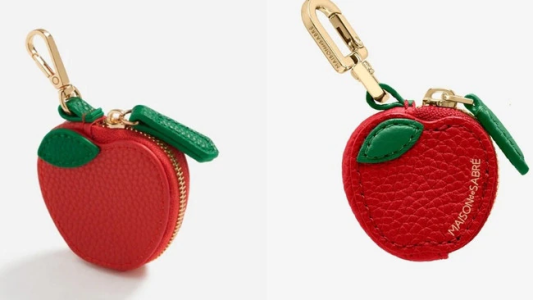Did a major retailer rip off Aussie designers? The case that could change IP laws
By
Maan
- Replies 0
Intellectual property disputes are nothing new in the world of fashion, but they often spark fierce debate when they hit close to home.
A recent claim from an Australian designer has cast a spotlight on the challenges creatives face in protecting their work.
What unfolded next has reignited concerns about originality, imitation and the future of design innovation.
A popular Australian fashion retailer came under fire after being accused of replicating a local designer’s signature product.
Maison de Sabre, known for its luxury leather goods, alleged that Sportsgirl copied its fruit-themed bag charms.
The Sydney-based brand launched the upcycled charms around two years ago, with prices ranging from $65 to $150.
These playful accessories quickly gained traction in international markets including Europe, the US and Asia.
Sportsgirl’s version of the charms, which resemble apples and oranges, reportedly sold for about $15.
The disputed products were not listed on Sportsgirl’s website at the time of the accusation.
Maison de Sabre co-founder Omar Sabre said it was ‘disappointing to see a major Australian retailer replicate a homegrown designer that had proudly taken Australian creativity to the world.’
He continued: ‘This kind of behaviour devalues original thinking and sends a discouraging message to independent brands striving to innovate.’
‘In an increasingly competitive retail market, it’s creativity that sets brands apart.’
‘For a well-resourced, national chain to shortcut that by reproducing what an independent brand has built from the ground up—it’s not just disappointing, it’s damaging to the future of Australian design.’
Mr Sabre also criticised the current state of Australia’s intellectual property protections, arguing they were failing creators.
‘Copyright does not automatically apply to product design, which leaves creators exposed and vulnerable to mass replication,’ he said.
‘As a country, we can’t talk about fostering innovation and then allow it to be undermined in plain sight.’
The Sussan Group, which owns Sportsgirl, was contacted for comment regarding the accusations.
Industry expert Paul Waddy weighed in, highlighting the challenges faced by small businesses.
‘They build with purpose, test relentlessly, and grow organically, but without proper design protection, they’re left wide open to being copied by larger players who can fast-track knockoffs without consequence,’ he said.
‘Until Australia modernises its intellectual property laws, we’re punishing innovation and rewarding imitation—and that’s a dangerous message to send in today’s global market.’
Intellectual property lawyer Sharon Givoni said the issue went beyond the legal sphere.
‘We know how common and disheartening imitation has become in the fashion world and Coco Chanel said, “If you want to be original, be ready to be copied,”’ she said.
‘From a legal perspective, fashion designers in Australia have a few options when their work is copied—but navigating them can be complex and overwhelming.’
Ms Givoni noted that copyright, trademarks and registered designs could provide limited protection.
‘The real challenge? Many designers don’t know which path to take—or assume they can’t afford protection,’ she said.
‘Add in fast fashion, social media, and global supply chains, and you’ve got a legal minefield for creatives just trying to do what they love.’
In a previous story, we explored another case of local creators facing challenges with large retailers.
This time, Aussie inventors are speaking out against Kmart’s alleged appropriation of their innovative design.
To learn more about this ongoing dispute, read the full story here.

As the debate over design protection continues, what do you think about the current state of intellectual property laws in Australia? Share your thoughts in the comments below!
A recent claim from an Australian designer has cast a spotlight on the challenges creatives face in protecting their work.
What unfolded next has reignited concerns about originality, imitation and the future of design innovation.
A popular Australian fashion retailer came under fire after being accused of replicating a local designer’s signature product.
Maison de Sabre, known for its luxury leather goods, alleged that Sportsgirl copied its fruit-themed bag charms.
The Sydney-based brand launched the upcycled charms around two years ago, with prices ranging from $65 to $150.
These playful accessories quickly gained traction in international markets including Europe, the US and Asia.
Sportsgirl’s version of the charms, which resemble apples and oranges, reportedly sold for about $15.
The disputed products were not listed on Sportsgirl’s website at the time of the accusation.
Maison de Sabre co-founder Omar Sabre said it was ‘disappointing to see a major Australian retailer replicate a homegrown designer that had proudly taken Australian creativity to the world.’
He continued: ‘This kind of behaviour devalues original thinking and sends a discouraging message to independent brands striving to innovate.’
‘In an increasingly competitive retail market, it’s creativity that sets brands apart.’
‘For a well-resourced, national chain to shortcut that by reproducing what an independent brand has built from the ground up—it’s not just disappointing, it’s damaging to the future of Australian design.’
Mr Sabre also criticised the current state of Australia’s intellectual property protections, arguing they were failing creators.
‘Copyright does not automatically apply to product design, which leaves creators exposed and vulnerable to mass replication,’ he said.
‘As a country, we can’t talk about fostering innovation and then allow it to be undermined in plain sight.’
The Sussan Group, which owns Sportsgirl, was contacted for comment regarding the accusations.
Industry expert Paul Waddy weighed in, highlighting the challenges faced by small businesses.
‘They build with purpose, test relentlessly, and grow organically, but without proper design protection, they’re left wide open to being copied by larger players who can fast-track knockoffs without consequence,’ he said.
‘Until Australia modernises its intellectual property laws, we’re punishing innovation and rewarding imitation—and that’s a dangerous message to send in today’s global market.’
Intellectual property lawyer Sharon Givoni said the issue went beyond the legal sphere.
‘We know how common and disheartening imitation has become in the fashion world and Coco Chanel said, “If you want to be original, be ready to be copied,”’ she said.
‘From a legal perspective, fashion designers in Australia have a few options when their work is copied—but navigating them can be complex and overwhelming.’
Ms Givoni noted that copyright, trademarks and registered designs could provide limited protection.
‘The real challenge? Many designers don’t know which path to take—or assume they can’t afford protection,’ she said.
‘Add in fast fashion, social media, and global supply chains, and you’ve got a legal minefield for creatives just trying to do what they love.’
In a previous story, we explored another case of local creators facing challenges with large retailers.
This time, Aussie inventors are speaking out against Kmart’s alleged appropriation of their innovative design.
To learn more about this ongoing dispute, read the full story here.
Key Takeaways
- Maison de Sabre accused Sportsgirl of copying its fruit-themed bag charms, originally launched two years ago.
- The disputed charms were reportedly sold by Sportsgirl for a fraction of the original price and were not listed online.
- Co-founder Omar Sabre and experts criticised Australia’s weak IP laws, saying they leave creators vulnerable to imitation.
- Legal professionals warned that fast fashion and social media have made protecting original designs more complex and costly.
As the debate over design protection continues, what do you think about the current state of intellectual property laws in Australia? Share your thoughts in the comments below!








